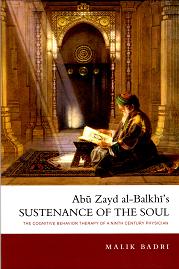The True Origins of CBT Lie within the Work of a 9th Century Islamic Scholar
Abu Zayd Ahmad ibn Sahl al-Balkhi was born in the year 849 C.E., or 235 A.H. (after hijra) in Islamic contexts. His life is minimally documented, with a single biography done by Yaqub al-Hamawi. Very little is know about his personal private life. Al-Balkhi was a scholar of medicine, history, philosophy, Arabic grammar, mathematics, and other disciplines.
During my studies at Johns Hopkins University’s in their Master’s of Science in Counseling program, I came across al-Balkhi’s name. A textbook for a introductory class, Counseling Theory and Practice, titled Theories and Applications of Counseling and Psychotherapy: Relevance Across Cultures and Setting (2018) mentioned him.
It said “throughout history many notable occurrences have clearly represented forward thinking in the providing of mental health assistance. One example of such a forward thinking occurred with the Muslim scholar Abu Zayd Ahmad ibn Sahl al-Balkhi, who wrote Sustenance for Body and Soul, a thesis that addressed what constitutes mental health, why various forms of mental illness occur, and procedures that would enable a suffering person to gain mental health.”
Al-Balkhi’s work sparked my interest and curiosity as the textbook went further to summarize his work, its relevance and importance. Although it was until almost exactly a year later that I actually read his translated text. A friend and colleague from graduate school purchased his book for me as an Eid-al-Fitr gift in the late spring of this year.
An English translation of Al-Balkhi’s Sustenance of the Soul was published in 2013. Malik Badri, the text translator, offers a summary at the beginning of the book, in which he states “Sadly, all too often Western historians of psychology generally start with the Greeks, then leap forward to the Renaissance and the age of European enlightenment, bypassing the Middle Ages and the contributions of the Islamic world as if no other civilizations had existed.”
Badri goes further to say “Even when mentioned, the contributions of the Muslim scholars and physicians are very briefly cited. I hope this work serves to rectify this, at least in the field of psychology, and give credit where credit is due.”
Unfortunately, at least in relation to my textbook, the mention of Al-Balkhi is still minimal, but the significance of his work is not.
In 2014, Qalam Foundation, published With the Heart in Mind, a book about the moral and emotional intelligence of the Prophet Muhammad, peace be upon him. It references Al-Balki’s work throughly. Pointing out that “What is even more stunning than [al-] Balkhi’s mental health analysis in the late 9th century is how long it took Western psychologists and physicians to develop a similar understanding.”
What is so stunning about al-Balkhi’s work is that he clearly delineates several types of psychological disorders in a way that is very similar to today’s DSM-5. Classifying them into fear and panic, anger and aggression, sadness and depression, and obsessions. Not only does he classify them but also provides levels of severity, another feature of the modern DSM-5. He doesn’t stop there. For each area he provides recommendations for treatment. This is where his cognitive-behavioral approach occurs.
“Internally means to protect the soul from internal symptoms of negative thinking about what may harm the person with respect to the symptoms or disorders that we have described.“
Sustenance of the Soul (page 31)
This quote illustrates Al-Balkhi’s simple, yet effective cognitive approach to remedying psychological disorders.
“A person should train himself himself not to overreact to the minor incidents or things that he hears or sees. When he trains himself to tolerate these little irritating experiences, this will (in time) become habitual and he will then be able to tolerate things that are more frustrating and experiences that are more annoying.”
Sustenance of the Soul (page 32)
This second quote highlights a behavioral approach. In junction, the two quotes demonstrate his use of cognitive-behavioral therapy (CBT).
Compared to modern writing on psychology, or even other Arabic authors of his time, his writing is quite direct and minimal. This has contributed to its timelessness and potentially why it is undervalued. It lacks the pretentious, academic air of many other scholars. On the contrary, it is accessible and easy to understand.
There is no doubt, once one has read Al-Balkhi’s work, that it provides a range of foundational ideas relevant to the field of modern psychology.



